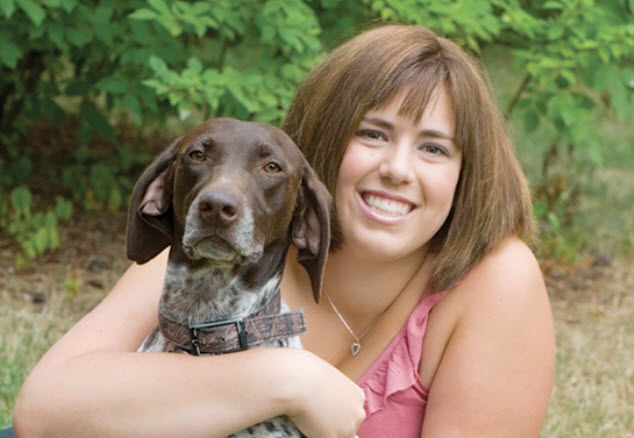
The Pointer - A Good Sport
If you're active and outdoorsy, chances are that you chose her because you like English Pointers and you expected her to have certain traits that would fit your lifestyle:
- Excellent family dog, watchdog, and hunting dog
- Intelligent and easy to train
- Gentle-mannered and easy to get along with
- Large, strong, and athletic, with lots of stamina
- Good with children
- Adaptable to a wide variety of living conditions
Because of the Pointer's active nature, you may have also noticed these characteristics:
- Can be rambunctious and rowdy, especially as a younger dog
- Requires vigorous, frequent exercise and space to run
- Prone to boredom and separation anxiety when left alone and will find trouble
- May have a tendency to bark excessively
- Sees cats and small animals as prey unless trained otherwise
- Can be independent and strong-willed
 Pointers are lean and powerful! She can play hard all day with her seemingly endless source of energy.
Pointers are lean and powerful! She can play hard all day with her seemingly endless source of energy.
Dating back to 1650, the Pointer originated in England and was bred to flush out bird game for hunters. Today she comes in many colors including white, lemon, orange, liver, and black. Because Pointers were bred for stamina they require vigorous daily exercise. When given enough physical and mental stimulation, they will thrive with any family! The English Pointer is a generally healthy breed with an average lifespan of 13-14 years.
Your Pointer's Health
We know that because you care so much about your dog, you want to take good care of her. That is why we have summarized the health concerns we will be discussing with you over the life of your Pointer. By knowing about health concerns specific to Pointers, we can tailor a preventive health plan to watch for and hopefully prevent some predictable risks.
Many diseases and health conditions are genetic, meaning they are related to your pet’s breed. There is a general consensus among canine genetic researchers and veterinary practitioners that the conditions we’ve described herein have a significant rate of incidence and/or impact in this breed. That does not mean your dog will have these problems; it just means that she is more at risk than other dogs. We will describe the most common issues seen in Pointers to give you an idea of what may come up in her future. Of course, we can’t cover every possibility here, so always check with us if you notice any unusual signs or symptoms.
This guide contains general health information important to all canines as well as the most important genetic predispositions for Pointers. This information helps you and us together plan for your pet’s unique medical needs. At the end of the article, we have also included a description of what you can do at home to keep your English Pointer looking and feeling her best. You will know what to watch for, and we will all feel better knowing that we’re taking the best possible care of your pal.
General Health Information for your Pointer
Dental Disease
Dental disease is the most common chronic problem in pets, affecting 80% of all dogs by age two. Unfortunately, your Pointer is more likely than other dogs to have problems with her teeth. Dental disease starts with tartar build-up on the teeth and progresses to infection of the gums and roots of the teeth. If we don’t prevent or treat dental disease, your buddy may lose her teeth and be in danger of damage to her kidneys, liver, heart, and joints. In fact, your Pointer's life span may even be cut short by one to three years! We’ll clean your dog’s teeth regularly and let you know what you can do at home to keep those pearly whites clean.
 Infections
Infections
Pointers are susceptible to bacterial and viral infections — the same ones that all dogs can get — such as parvo, rabies, and distemper. Many of these infections are preventable through vaccination, which we will recommend based on her age, the diseases we see in our area, and other factors.
Obesity
Obesity can be a significant health problem in Pointers. It is a serious disease that may cause or worsen joint problems, metabolic and digestive disorders, back pain, and heart disease. Though it’s tempting to give your pal food when she looks at you with those soulful eyes, you can “love her to death” with leftover people food and doggie treats. Instead, give her a hug, brush her fur or teeth, play a game with her, or perhaps take her for a walk. She’ll feel better, and so will you!
Parasites
All kinds of worms and bugs can invade your English Pointer's body, inside and out. Everything from fleas and ticks to ear mites can infest her skin and ears. Hookworms, roundworms, heartworms, and whipworms can get into her system in a number of ways: drinking unclean water, walking on contaminated soil, or being bitten by an infected mosquito. Some of these parasites can be transmitted to you or a family member and are a serious concern for everyone. For your canine friend, these parasites can cause pain, discomfort, and even death, so it’s important that we test for them on a regular basis. We’ll also recommend preventive medication as necessary to keep her healthy.
Spay or Neuter
One of the best things you can do for your Pointer is to have her spayed (neutered for males). In females, this means we surgically remove the ovaries and usually the uterus, and in males, it means we surgically remove the testicles. Spaying or neutering decreases the likelihood of certain types of cancers and eliminates the possibility of your pet becoming pregnant or fathering unwanted puppies. Performing this surgery also gives us a chance, while your pet is under anesthesia, to identify and address some of the diseases your dog is likely to develop. For example, if your pet needs hip X-rays or a puppy tooth extracted, this would be a good time—it’s more convenient for you and easier on your friend too. Routine blood testing prior to surgery also helps us to identify and take precautions against common problems that increase anesthetic or surgical risk. Don’t worry; we’ll discuss the specific problems we will be looking for when the time arrives.
Genetic Predispositions for Pointers
Bloat
Gastric dilatation volvulus, also known as GDV or bloat, usually occurs in dogs with deep, narrow chests. This means your Pointer is more at risk than other breeds. When a dog bloats, the stomach twists on itself and fills with gas. The twisting cuts off the blood supply to the stomach and sometimes to the spleen. Left untreated, the disease is quickly fatal, sometimes in as little as half an hour. Your dog may retch or heave (but little or nothing comes up), act restless, have an enlarged abdomen, or lie in a prayer position (front feet down, rear end up). Preventive surgery in which the stomach is tacked down or sutured in place so that it is unlikely to twist is an option. If you see symptoms, take your pet to an emergency hospital immediately!
 Hip and Elbow Dysplasia
Hip and Elbow Dysplasia
Both hips and elbows are at risk for dysplasia, an inherited disease that causes the joints to develop improperly and results in arthritis. Stiffness in your Pointer’s elbows or hips may become a problem for him, especially as he matures. You may notice that he begins to show lameness in his legs or has difficulty getting up from lying down. We can treat the arthritis—the sooner the better—to minimize discomfort and pain. We’ll take X-rays of your dog’s bones to identify issues as early as possible. Surgery is also sometimes a good option in severe and life-limiting cases. And keep in mind that overweight dogs may develop arthritis years earlier than those of normal weight, causing undue pain and suffering!
Multiple Skin Problems
Your English Pointer is susceptible to various kinds of skin infections and diseases. One type, Malassezia dermatitis, is caused by a kind of yeast. When this yeast infects the ears, it causes itching, redness, and an accumulation of brown, waxy discharge. On the skin, this yeast leads to greasy, hairless areas, especially on the neck and throat, with a characteristic odor. Another common skin disease called seborrhea can cause dry, flaky skin or greasy, oily skin. Skin diseases make your pet itchy and uncomfortable. Bathing with special shampoos and rinses may be helpful, and we’ll treat any underlying problems such as allergies as well. The earlier you call to have your pet’s skin problems checked, the less likely you will end up with an itchy, bald, smelly dog.
Allergies
In humans, allergies to pollen, mold, or dust make people sneeze. In dogs, rather than sneezing, allergies make their skin itchy. We call this skin allergy “atopy”, and Pointers often have it. The feet, belly, folds of the skin, and ears are most commonly affected. Symptoms typically start between the ages of one and three and can get worse every year. Licking the paws, rubbing the face, and frequent ear infections are the most common signs of allergies. The good news is that there are many treatment options available for these conditions.
Mange
Demodex is a microscopic mite that lives in the hair follicles of all dogs. Normally a dog’s immune system keeps the mites in check, but some breeds, like your Pointer, may develop an overabundance of these mites. In mild cases, pet owners may notice a few dry, irritated, hairless lesions. These often occur on the face or feet and may or may not be itchy. Secondary skin infections may also occur. Prompt veterinary care is important to keep the disease from getting out of hand. Many pets seem to outgrow the problem, while others require lifelong management.
Juvenile Cellulitis
Juvenile cellulitis occurs more frequently in Pointers than in other breeds, and multiple puppies in a litter may be affected. Puppies with juvenile cellulitis will develop swelling and inflammation of the face and of the lymph nodes under the jaw, but the disease responds well to antibiotic and steroid therapy if treated right away.
Cancer
Cancer is a leading cause of death in older dogs. Your English Pointer will likely live longer than many other breeds and therefore is more prone to get cancer in his golden years. Many cancers are curable by surgical removal, and some types are treatable with chemotherapy. Early detection is critical! We’ll perform periodic diagnostic tests and look for lumps and bumps when we examine your pet.
- Hemangiosarcoma is a type of bleeding tumor that affects Pointers at greater than average incidence. These tumors commonly form in the spleen, but can form in other organs as well. Unbeknownst to a pet owner, the tumor breaks open and internal bleeding occurs. Some tumors can be volleyball-sized or larger before signs of sickness show. We often find clues that one of these tumors is present during senior wellness testing, so have his blood tested and an ultrasound performed at least yearly.
- Mast cell tumors are a particularly nasty type of skin cancer found more often in Pointers than other breeds. The sooner these tumors are surgically removed, the better. Unfortunately, mast cell tumors often look very similar to other kinds of skin lumps and lesions, many of which are not harmful. Therefore, all suspicious lumps should be tested and surgically removed as soon as possible. Many cancers are cured by surgical removal, so early detection is critical.
 Hypoadrenocorticism (Addison's)
Hypoadrenocorticism (Addison's)
Addison's Disease is an endocrine system disorder that occurs when the adrenal glands fail to produce enough hormones to keep the body functioning normally. Left untreated, hypoadrenocorticism can be fatal. Symptoms often mimic many other diseases, but we can run a specialized blood test to check for this specific condition. Though this disease can occur in any type of dog, Bassets are more at risk. We'll be watching for clinical signs at every exam at Ingleside Animal Hospital and will periodically check his electrolyte levels to screen for this problem.
Bleeding Disorders
There are several types of inherited bleeding disorders that occur in dogs. They range in severity from very mild to very severe. Many times a pet seems normal until a serious injury occurs or surgery is performed, and then severe bleeding can result. Von Willebrand’s disease is a blood clotting disorder frequently found in Pointers. We’ll conduct diagnostic testing for blood clotting times or a specific DNA blood test for Von Willebrand’s disease and other similar disorders to check for this problem before we perform surgery.
Blastomycosis
Blastomycosis is a serious fungal infection that damages the lungs and may also infect the bones, skin, eyes and other organs. The fungal spores that cause blastomycosis may be inhaled while digging, hunting, or exploring, usually in undeveloped areas or near wetlands. Regular examinations of your pet’s lungs are critical as blastomycosis infections are often fatal if not treated.
Reproductive Difficulties
Breeds with a large head and small pelvis are more prone to difficulties during the birthing process. The female’s pelvis may be too small to pass the puppies’ heads and a C-section is often required for her health and that of her puppies. If you are interested in breeding your Pointer, speak with us first. We can help you make an informed decision based on the body conformations of both sire and dam.
Epilepsy
There are three types of seizures in dogs: reactive, secondary, and primary. Reactive seizures are caused by the brain's reaction to a metabolic problem like low blood sugar, organ failure, or a toxin. Secondary seizures are the result of a brain tumor, stroke, or trauma. If no other cause can be found, the disease is called primary or idiopathic epilepsy. This problem is often an inherited condition, and Pointers are commonly afflicted. If your friend is prone to seizures, episodes will usually begin between six months and three years of age. An initial diagnostic workup may help find the cause. Lifelong medication is usually necessary to help keep seizures under control with periodic blood testing required to monitor side effects and efficacy. If your dog has a seizure, carefully prevent him from injuring himself, but don't try to control his mouth or tongue. It won't help him, and he may bite you accidentally! Note the length of the seizure, and call us or an emergency hospital.
Dental Abnormalities
Teeth abnormalities are often genetically induced and are relatively common in dogs, especially in purebred dogs like your Pointer. An overbite or underbite is called a malocclusion or a bad bite. Oligodontia is a condition where only a few teeth are present. Misaligned teeth can also occur and cause lots of problems, but can usually be corrected with braces or extractions. (Yes, dogs can get braces!) We want to keep your buddy’s teeth healthy, so we will be watching his developing teeth closely.
Thyroid Problems
Pointers are prone to a common condition called hypothyroidism in which the body doesn’t make enough thyroid hormone. Signs can include dry skin and coat, hair loss, susceptibility to other skin diseases, weight gain, fearfulness, aggression, and other behavioral changes. We’ll conduct a blood test annually to screen for this disease. Treatment is usually as simple as replacement hormones given in the form of a pill.
Heart Disease
Some Pointers inherit a heart condition known as aortic stenosis. This disease causes a partial obstruction to the blood flow leaving the heart, which means the heart must work harder to pump enough blood to the body. If the condition is severe, your dog may faint or seem to run out of energy during exercise. He may also have difficulty breathing, cough frequently, or have stunted growth. We’ll test for this disease if your pet has any of these symptoms and discuss treatment options with you if the condition is indicated.
Eye Problems
Not many things have as dramatic an impact on your dog's quality of life as the proper functioning of his eyes. Unfortunately, Pointers can inherit or develop a number of different eye conditions, some of which may cause blindness if not treated right away, and most of which can be extremely painful! We will evaluate his eyes at every examination to look for any signs for concern.
- Cataracts are a common cause of blindness in older Pointers. We’ll watch for the lenses of his eyes to become more opaque—meaning they look cloudy instead of clear—when we examine him. Many dogs adjust well to losing their vision and get along just fine. Surgery to remove cataracts and restore sight may also be an option.
- Entropion is a condition in which the eyelid rolls inward, causing the eyelashes to rub against the cornea (the surface of the eyeball). This is an extremely irritating and painful condition that can ultimately lead to blindness. Entropion can occur in any dog breed, however, your Pointer is especially at risk for this heritable disorder. Surgical correction is usually successful if performed early.
Taking Care of Your Pointer at Home
 Much of what you can do to keep your dog happy and healthy is common sense, just like it is for people. Watch her diet, make sure she gets plenty of exercise, regularly brush her teeth and coat, and call us or a pet emergency hospital when something seems unusual (see “What to Watch For” below). Be sure to adhere to the schedule of examinations and vaccinations that we recommend for her. This is when we’ll give her the necessary “check-ups” and test for diseases and conditions that are common in Pointers. Another very important step in caring for your pet is signing up for pet health insurance. There will certainly be medical tests and procedures she will need throughout her life and pet health insurance will help you cover those costs.
Much of what you can do to keep your dog happy and healthy is common sense, just like it is for people. Watch her diet, make sure she gets plenty of exercise, regularly brush her teeth and coat, and call us or a pet emergency hospital when something seems unusual (see “What to Watch For” below). Be sure to adhere to the schedule of examinations and vaccinations that we recommend for her. This is when we’ll give her the necessary “check-ups” and test for diseases and conditions that are common in Pointers. Another very important step in caring for your pet is signing up for pet health insurance. There will certainly be medical tests and procedures she will need throughout her life and pet health insurance will help you cover those costs.
Routine Care, Diet, and Exercise
Build her routine care into your schedule to help your English Pointer live longer, stay healthier, and be happier during her lifetime. We cannot overemphasize the importance of a proper diet and exercise routine.
- Supervise your pet as you would a toddler. Keep doors closed, pick up after yourself, and block off rooms as necessary. This will keep her out of trouble and away from objects she shouldn’t put in her mouth.
- She has low grooming needs. Brush her coat as needed, at least weekly.
- Pointers often have serious problems with their teeth, so you’ll need to brush them at least three times a week!
- Clean her ears weekly, even as a puppy. Don’t worry—we’ll show you how!
- She has a short coat and should be kept inside during cold weather.
- She is a high-energy hunting dog, so a fenced yard and leashed walks are a must.
- She is an excellent hiking and biking companion, and she excels at agility, flyball, and obedience events.
- Keep your dog’s diet consistent and don’t give her people food.
- Feed a high-quality diet appropriate for her age.
- Exercise your dog regularly, but don’t overdo it at first.
What to Watch For
Any abnormal symptom could be a sign of serious disease or it could just be a minor or temporary problem. The important thing is to be able to tell when to seek veterinary help and how urgently. Many diseases cause dogs to have a characteristic combination of symptoms, which together can be a clear signal that your Pointer needs help.
Office Calls
Give us a call for an appointment if you notice any of these types of signs:
- Change in appetite or water consumption
- Tartar build-up, bad breath, red gums, or broken teeth
- Itchy skin (scratching, chewing, or licking); hair loss
- Lethargy, mental dullness, or excessive sleeping
- Fearfulness, aggression, or other behavioral changes
- Dull coat, hair loss; sluggish, weight gain
- Lumps or bumps – regardless of size
Emergencies
Seek medical care immediately if you notice any of these types of signs:
- Scratching or shaking the head, tender ears, or ear discharge
- Inability or straining to urinate; discolored urine
- Cloudiness, redness, itching, or any other abnormality involving the eyes
- Dry heaving or a large, tight, painful abdomen
- General reluctance to run or play
- Leg stiffness; reluctance to rise, sit, use stairs, or jump; “bunny hopping”
- Dry, scaly, sometimes itchy hairless patches on face or paws
- General listlessness, droopy facial expression, vomiting, diarrhea
- Any abnormal shaking, trembling, or excessive involuntary tremors
- Fainting, weakness, cough, or shortness of breath during exercise
